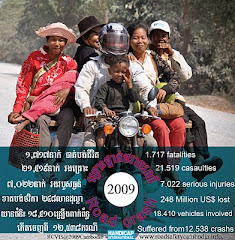Malaysian-born movie actress Yeoh advocates for road accident injuries to be recognised as a global public health and development priority.
She said the region was facing an epidemic of road accident deaths and injuries, adding that there were innovative Asian road safety solutions such as the International Road Assessment Programme, "which is transforming the way we understand safe road design", and the Global Helmet Vaccine Initiative.
"There is so much we can do to save lives on our roads," said the global ambassador for the "Make Roads Safe" campaign who is known for her roles in movies such as James Bond''s ''Tomorrow Never Dies'' and ''Crouching Tiger, Hidden Dragon''.
The ADB said in a statement that Yeoh was at the bank''s headquarters in Manila to participate in a three-day transport forum where leading experts from around the world discussed crucial issues facing transport in Asia and the Pacific.
ADB vice-president for Knowledge Management and Sustainable Development, Ursula Schaefer-Preussm, said each year, about 1.18 million people globally died in road accidents and 60 per cent of all road accidents occurred in the region.
"Equally notable is how this issue impacts the poor, who suffer gravely from unsafe roads, while remaining marginalised by transport policies that are bias in favour of private vehicles," she said.
The ADB said it had developed a new paradigm for sustainable urban transport that offered the prospect of much more effective management of the region's cities over the coming years.
The strategy includes a strong push for a people-focused "avoid-shift-improve" approach that promotes accessibility instead of mobility and manages demand for travel to supply instead of building more infrastructure for the seemingly unstoppable growth in private vehicles.
This involves developing an efficient land-use and transport system to help city dwellers avoid motor transport, a shift towards energy-efficient modes of travel, particularly public transport, and measures to improve vehicle and fuel technologies. -- BERNAMA


No comments:
Post a Comment